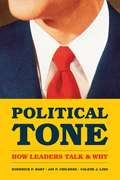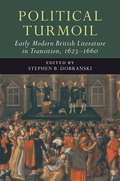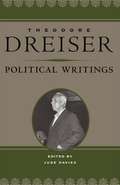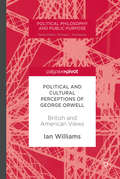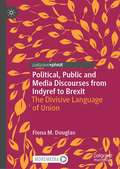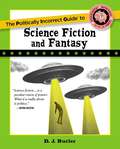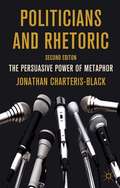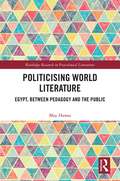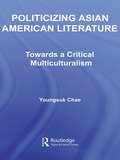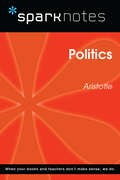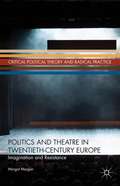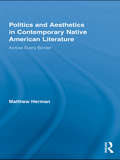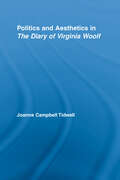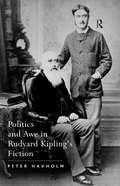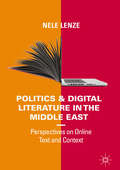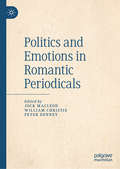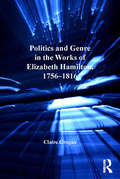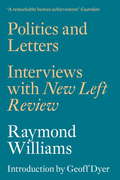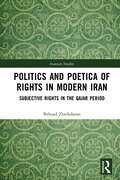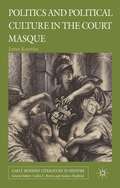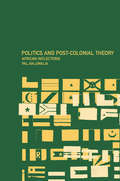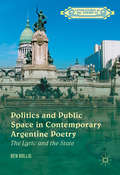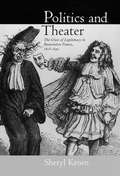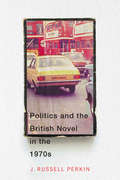- Table View
- List View
Political Tone: How Leaders Talk and Why
by Roderick P. Hart Jay P. Childers Colene J. LindIt's not what you say, but how you say it. Solving problems with words is the essence of politics, and finding the right words for the moment can make or break a politician's career. Yet very little has been said in political science about the elusive element of tone. In Political Tone, Roderick P. Hart, Jay P. Childers, and Colene J. Lind analyze a range of texts--from speeches and debates to advertising and print and broadcast campaign coverage-- using a sophisticated computer program, DICTION, that parses their content for semantic features like realism, commonality, and certainty, as well as references to religion, party, or patriotic terms. Beginning with a look at how societal forces like diversity and modernity manifest themselves as political tones in the contexts of particular leaders and events, the authors proceed to consider how individual leaders have used tone to convey their messages: How did Bill Clinton's clever dexterity help him recover from the Monica Lewinsky scandal? How did Barack Obama draw on his experience as a talented community activist to overcome his inexperience as a national leader? And how does Sarah Palin's wandering tone indicate that she trusts her listeners and is open to their ideas? By focusing not on the substance of political arguments but on how they were phrased, Political Tone provides powerful and unexpected insights into American politics.
Political Turmoil: Volume 2 (Early Modern Literature in Transition)
by Stephen B. DobranskiThe early modern period in Britain was defined by tremendous upheaval - the upending of monarchy, the unsettling of church doctrine, and the pursuit of a new method of inquiry based on an inductive experimental model. Political Turmoil: Early Modern Literature in Transition, 1623–1660 offers an innovative and ambitious re-appraisal of seventeenth-century British literature and history. Each of the contributors attempts to address the 'how' and 'why' of aesthetic change by focusing on political and cultural transformations. Instead of forging a grand narrative of continuity, the contributors attempt to piece together the often complex web of factors and events that contributed to developments in literary form and matter - as well as the social and religious changes that literature sometimes helped to occasion. These twenty chapters, reading across traditional periodization, demonstrate that early modern literary works - when they were conceived, as they were created, and after they circulated - were, above all, involved in various types of transitions.
Political Writings
by Theodore DreiserTheodore Dreiser staked his reputation on fearless expression in his fiction, but he never was more outspoken than when writing about American politics. Spanning a period in American history from the Progressive Era to the advent of the Cold War, this generous volume collects Dreiser's most important political writings from his journalism, broadsides, speeches, private papers, and long out-of-print nonfiction books. Touching on the Great Depression, the New Deal, and both World Wars as well as Soviet Russia and the persecution of Jews in Nazi Germany, these writings exemplify Dreiser's candor and his penchant for championing the defenseless and railing against corruption. The works also navigate historical terrain with prescient observations on topics such as religion, civil rights, national responsibility, individual ethics, global relations, and censorship that remain relevant to a contemporary audience.
Political and Cultural Perceptions of George Orwell
by Ian WilliamsThis book analyzes George Orwell's politics and their reception across both sides of the Atlantic. It considers Orwell's place in the politics of his native Britain and his reception in the USA, where he has had some of his most fervent emulators, exegetists, and detractors. Written by an ex "teenage Maoist" from Liverpool, UK, who now lives and writes in New York, the book points out how often the different strands of opinion derive from "ancestral" ideological struggles within the Communist/Trotskyist movement in the 30's, and how these often overlook or indeed consciously ignore the indigenous British politics and sociology that did so much to influence Orwell's political and literary development. It examines in the modern era what Orwell did in his-the seductions of simplistic and absolutist ideologies for some intellectuals, especially in their reactions to Orwell himself.
Political, Public and Media Discourses from Indyref to Brexit: The Divisive Language of Union (Rhetoric, Politics and Society)
by Fiona M. DouglasThis book focuses on the language of two unions (the United Kingdom and the European Union), tracing the emergence of divisive discourses from indyref to Brexit. It explains the background to the creation of these unions and summarizes recent political events that have brought their future into question. It considers which identities (national, supranational, social, ethnic or racial) were invoked during the indyref and EU referendum campaigns, emphasising the crucial role played by language in maintaining these identities, in conceptualizing the nation, to do politics, and its power to unite or divide. Based on analysis of three specialist corpora totaling over 143 million words and comprising multiple text types (newspapers, speeches, Twitter posts, parliamentary debates, party political websites and campaign materials), it interrogates the language used by politicians, the media and the public, uncovering increasingly problematic, scaremongering, xenophobic and incendiary linguistic strategies used to divide us from them.
Politically Incorrect Guide to Science Fiction and Fantasy
by D. J. ButlerA guide to the most illuminating literature of the modern world. Science fiction and fantasy comprise some of the great works of the human imagination—and some of the most abhorrent. This is your Politically Incorrect Guide® to a literary tradition that is a key to understanding the modern world. Before men knew how to write, they were telling each other stories of gods and monsters. But science fiction and fantasy are not escapist literatures and they never have been. Science fiction grapples with the great questions of technology and human society. Fantasy grapples with the great questions of the human spirit. A reader who can find his way to the enduring classics of these genres will be immeasurably enriched. In this book you&’ll learn about futurists and dreamers such as Ray Bradbury and J. R. R. Tolkien, master storytellers such as Orson Scott Card and Isaac Asimov, troubled scribes such as J. K. Rowling and George R. R. Martin, and failed visionaries preaching a dysfunctional anti-human future such as Ursula LeGuin and her covens of woke disciples infesting the literature of the imagination.The Politically Incorrect Guide to Science Fiction and Fantasy is a gazetteer to futures filled with big dreams and innovation, imparting a healthy sense of wonder and mapping those dangerous regions filled with dragons waiting to consume with fire the careless, uninformed, and prideful. All is chaos, yet nothing is new. This is the perfect moment to give guidance to readers and to new practitioners alike.
Politicians and Rhetoric
by Jonathan Charteris-BlackThis analysis of the rhetoric of nine successfully persuasive politicians explains how their use of language created credible and consistent stories about themselves and the social world they inhabit. It explores their use of metaphors, their myths and how language analysis helps us to understand how politicians are able to persuade.
Politicising World Literature: Egypt, Between Pedagogy and the Public (Routledge Research in Postcolonial Literatures)
by May HawasPoliticising World Literature: Egypt, Between Pedagogy and the Public engages with postcolonial and world literature approaches to examine the worldly imaginary of the novel genre and assert the political imperative to teaching world literature. How does canonising world literature relate to societal, political or academic reform? Alternating between close reading of texts and literary history, this monograph studies a corpus of novels and travelogues in English, Arabic, French, Czech and Italian to historicise Egypt’s literary relations with different parts of the world in both the modern period and the pre-modern period. In this rigorous study, May Hawas argues that protagonists, particularly in times of political crises, locate themselves as individuals with communal or political affiliations that supersede, if not actually resist, national affiliations.
Politicizing Asian American Literature: Towards a Critical Multiculturalism (Studies in Asian Americans)
by Youngsuk ChaeThis book examines U.S. multiculturalism from the perspective of Asian American writings, drawing contrasts between politically acquiescent multiculturalism and politically conscious multiculturalism. Chae discusses the works of writers who have highlighted a critical awareness of Asian Americans’ social and economic status and their position as 'unassimilable aliens', 'yellow perils', 'coolies', 'modern-day high tech coolies', or as a 'model minority', which were ideologically woven through the complex interactions of capital and labor in the U.S. cultural and labor history. Chae suggests that more productive means of analysis must be brought to the understanding of Asian American writings, many of which have been attempting to raise awareness of the politicizing effects of U.S. multiculturalism.
Politics (SparkNotes Philosophy Guide)
by SparkNotesPolitics (SparkNotes Philosophy Guide) Making the reading experience fun! SparkNotes Philosophy Guides are one-stop guides to the great works of philosophy–masterpieces that stand at the foundations of Western thought. Inside each Philosophy Guide you&’ll find insightful overviews of great philosophical works of the Western world.
Politics And Theatre In Twentieth-century Europe
by Margot MorganThis book explores the connection between politics and theatre by looking at the works and lives of Shaw, Brecht, Sartre, and Ionesco, providing a cultural history detailing the changing role of political theatre in twentieth-century Europe.
Politics and Aesthetics in Contemporary Native American Literature: Across Every Border (Indigenous Peoples and Politics)
by Matthew HermanOver the last twenty years, Native American literary studies has taken a sharp political turn. In this book, Matthew Herman provides the historical framework for this shift and examines the key moments in the movement away from cultural analyses toward more politically inflected and motivated perspectives. He highlights such notable cases as the prevailing readings of the popular within Native American writing; the Silko-Erdrich controversy; the ongoing debate over the comparative value of nationalism versus cosmopolitanism within Native American literature and politics; and the status of native nationalism in relation to recent critiques of the nation coming from postmodernism, postcolonialism, and subaltern studies. Herman concludes that the central problematic defining the last two decades of Native American literary studies has involved the emergence in theory of anti-colonial nationalism, its variants, and its contradictions. This study will be a necessary addition for students and scholars of Native American Studies as well as 20th-century literature.
Politics and Aesthetics in The Diary of Virginia Woolf (Studies in Major Literary Authors)
by Joanne TidwellIn this critical study, Tidwell examines the conflict of aesthetics and politics in The Diary of Virginia Woolf. As a modernist writer concerned with contemporary aesthetic theories, Woolf experimented with limiting the representative nature of writing. At the same time, as a feminist, Woolf wanted to incorporate her political interests in her fiction, but overt political statement conflicted with her aesthetic ideals. Her solution was to combine innovative narrative techniques and subject matter traditionally associated with women. Tidwell analyzes several of Woolf’s novels, including To the Lighthouse, Jacob’s Room, and Between the Acts to elucidate the diary’s technique and form, as well as to cast it as a valuable contribution to Woolf’s canon.
Politics and Awe in Rudyard Kipling's Fiction
by Peter HavholmThere has been a resurgence of interest in Kipling among critics who struggle to reconcile the multiple pleasures offered by his fiction with the controversial political ideas that inform it. Peter Havholm takes up the challenge, piecing together Kipling's understanding of empire and humanity from evidence in Anglo-Indian and Indian newspapers of the 1870s and 1880s and offering a new explanation for Kipling's post-1891 turn to fantasy and stories written to be enjoyed by children. By dovetailing detailed contextual knowledge of British India with informed and sensitive close readings of well-known works like 'The Man Who Would Be King',' Kim', 'The Light That Failed', and 'They', Havholm offers a fresh reading of Kipling's early and late stories that acknowledges Kipling's achievement as a writer and illuminates the seductive allure of the imperialist fantasy.
Politics and Digital Literature in the Middle East: Perspectives On Online Text And Context
by Nele LenzeDuring the 2000's, online literature in Arabic language was popular among a larger readership. Writings on subjects dealing with politics, globalization, and social matters gained are well-received. While mapping the genre, this monograph shows literary developments in print and digital during these peak years to provide a historical context for the material. Online literary culture is linked to social, economic, and political developments within the last two decades. This book presents the differences between online and print literature as it relates to writer-readership interaction, literary quality, language and style, critical reception, and circulation. The geographic location of the analysis focuses on Gulf countries featuring a comparative study of Egypt and Lebanon.
Politics and Emotions in Romantic Periodicals
by William Christie Jock Macleod Peter DenneyThis book comprises eleven essays by leading scholars of early nineteenth-century British literature and periodical culture. The collection addresses the many and varied links between politics and the emotions in Romantic periodicals, from the revolutionary decade of the 1790s, to the 1832 Reform Bill. In so doing, it deepens our understanding of the often conflicted relations between politics and feelings, and raises questions relevant to contemporary debates on affect studies and their relation to political criticism. The respective chapters explore both the politics of emotion and the emotional register of political discussion in radical, reformist and conservative periodicals. They are arranged chronologically, covering periodicals from Pigs’ Meat to Blackwood’s Edinburgh Magazine and the Spectator. Recurring themes include the contested place of emotion in radical political discourse; the role of the periodical in mediating action and performance; the changing affective frameworks of cultural politics (especially concerning gender and nation), and the shifting terrain of what constitutes appropriate emotion in public political discourse.
Politics and Genre in the Works of Elizabeth Hamilton, 1756–1816
by Claire GroganIn the first book-length study of the well-respected and popular British writer Elizabeth Hamilton, Claire Grogan addresses a significant gap in scholarship that enlarges and complicates critical understanding of the Romantic woman writer. From 1797 to 1818, Hamilton published in a wide range of genres, including novels, satires, historical and educational treatises, and historical biography. Because she wrote from a politically centrist position during a revolutionary age, Grogan suggests, Hamilton has been neglected in favor of authors who fit within the Jacobin/anti-Jacobin framework used to situate women writers of the period. Grogan draws attention to the inadequacies of the Jacobin/anti-Jacobin binary for understanding writers like Hamilton, arguing that Hamilton and other women writers engaged with and debated the issues of the day in more veiled ways. For example, while Hamilton did not argue for sexual emancipation à la Mary Wollstonecraft and Mary Hays, she asserted her rights in other ways. Hamilton's most radical advance, Grogan shows, was in her deployment of genre, whether she was mixing genres, creating new generic medleys, or assuming competence in a hitherto male-dominated genre. With Hamilton serving as her case study, Grogan persuasively argues for new strategies to uncover the means by which women writers participated in the revolutionary debate.
Politics and Letters
by Geoff Dyer Raymond WilliamsRaymond Williams made a central contribution to the intellectual culture of the Left in the English-speaking world. He was also one of the key figures in the foundation of cultural studies in Britain, which turned critical skills honed on textual analysis to the examination of structures and forms of resistance apparent in everyday life. Politics and Letters is a volume of interviews with Williams, conducted by New Left Review, designed to bring into clear focus the major theoretical and political issues posed by his work. Introduced by writer Geoff Dyer, Politics and Letters ranges across Williams's biographical development, the evolution of his cultural theory and literary criticism, his work on dramatic forms and his fiction, and an exploration of British and international politics.From the Trade Paperback edition.
Politics and Poetica of Rights in Modern Iran: Subjective Rights in the Qajar Period (Iranian Studies)
by Behzad ZerehdaranThis book delves into the history of subjective rights within the context of 19th-century Iran, specifically during the eventful Qajar era. The crux of its research lies in the emergence and evolution of the concept of subjective rights as opposed to the notion of objective rights. During this pivotal period, this transition marked a paradigm shift from “right as to be right” to “right as to have a right.” A central pillar of this book is the creation of a meta-theory, one that sheds light on the semantical evolution of the concept of rights. Within these pages, readers will find a concise history, tracing the conceptual path that led from the objective to the subjective realm of rights. In addition to these historical explorations, it delves into the intricate field of rights theory, investigating the foundations and justifications of rights. Employing the Hohfeldian framework, it analyses various conceptions of rights as they manifest within travel literature, enlightenment literature, and dream literature of the Qajar era. This book will be of interest to scholars and students with an interest in Iranian studies, Iranian history, Persian literature and human rights.
Politics and Political Culture in the Court Masque
by James KnowlesPolitics and Political Culture in the Court Masque considers the interconnections of the masque and political culture. It examines how masques responded to political forces and voices beyond the court, and how masques explored the limits of political speech in the Jacobean and Caroline periods.
Politics and Post-Colonial Theory: African Inflections
by Pal AhluwaliaThis groundbreaking book makes sense of the complexities and dynamics of post-colonial politics, illustrating how post-colonial theory has marginalised a huge part of its constituency, namely Africa.Politics and Post-Colonial Theory traces how African identity has been constituted and reconstituted by examining issues such as:* negritude* the rise of nationalism* decolonisation.The book also questions how helpful post-colonial analysis can be in understanding the complexities which define institutions including:* the nation-state* civil society* human rights* citizenship.Politics and Post-colonial Theory bravely breaks down disciplinary boundaries. Its radical vision will be essential reading for all those engaged in Politics, post-colonial studies and African studies.
Politics and Public Space in Contemporary Argentine Poetry
by Ben BolligThis book addresses the connection between political themes and literary form in the most recent Argentine poetry. Ben Bollig uses the concepts of "lyric" and "state" as twin coordinates for both an assessment of how Argentinian poets have conceived a political role for their work and how poems come to speak to us about politics. Drawing on concepts from contemporary literary theory, this striking study combines textual analysis with historical research to shed light on the ways in which new modes of circulation help to shape poetry today.
Politics and Skepticism in Antebellum American Literature
by Dominic MastroianniIn confronting their tumultuous time, antebellum American writers often invoked unrevealable secrets. Five of Ralph Waldo Emerson s most inventive interlocutors - Melville, Hawthorne, Dickinson, Douglass, and Jacobs - produced their most riveting political thought in response to Emerson s idea that moods fundamentally shape one s experience of the world, changing only through secret causes that no one fully grasps. In this volume, Dominic Mastroianni frames antebellum and Civil War literature within the history of modern philosophical skepticism, ranging from Descartes and Hume to Levinas and Cavell, arguing that its political significance lies only partially in its most overt engagement with political issues like slavery, revolution, reform, and war. It is when antebellum writing is most philosophical, figurative, and seemingly unworldly that its political engagement is most profound. Mastroianni offers new readings of six major American authors and explores the teeming archive of nineteenth-century print culture. "
Politics and Theater: The Crisis of Legitimacy in Restoration France, 1815-1830
by Sheryl KroenIn this book, Sheryl Kroen views post-revolutionary France in the years of the Restoration. Following the lead of the French men and women who turned to this play in the 1820s to make sense of their world, Kroen exposes the crisis of legitimacy defining the regime in these years and demonstrates how the people of the time made steps toward a democratic resolution to this crisis.
Politics and the British Novel in the 1970s
by J. Russell PerkinThe 1970s in Britain saw a series of industrial disputes, a referendum on membership in the European Economic Community, conflict about issues of immigration and citizenship, and emergent environmental and feminist movements. It was also a decade of innovation in the novel, and novelists often addressed the state of the nation directly in their works.In Politics and the British Novel in the 1970s Russell Perkin looks at social novels by John Fowles and Margaret Drabble, the Cold War thrillers of John le Carré, Richard Adams's best-selling fable Watership Down, the popular campus novels of Malcolm Bradbury and David Lodge, Doris Lessing's dystopian visions, and V.S. Naipaul's explorations of post-colonial displacement. Many of these highly regarded works sold in large numbers and have enjoyed enduring success – a testament to the power of the political novel to explain a nation to itself. Perkin explores the connections between the novel and politics, situating the works it discusses in the rich context of the history and culture of the decade, from party politics to popular television shows.Politics and the British Novel in the 1970s elucidates a period of literary history now fifty years in the past and offers a balanced perspective on the age, revealing that these works not only represented the politics of the time but played a meaningful role in them.
